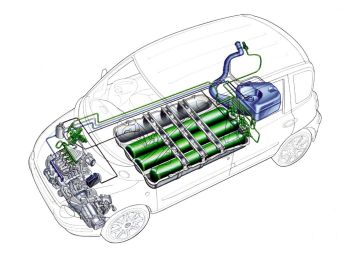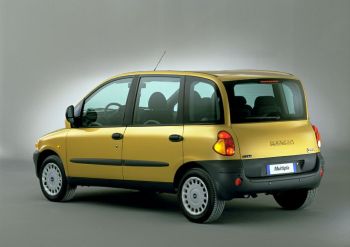|
A significant
feature of the announcement that Fiat plan to begin major
car production operations in Iran, is that the Middle
Eastern country will become a global 'hub' for the
production of alternative-fuels vehicles.
Intense
attention in Italy has been focused on this major new deal
over the last 48 hours, with the workforce at the giant
Turinese Mirafiori factory, once again fearing that they
could bear the brunt of any production switch.
Under the terms of the new agreement, Pars Industrial
Development Foundation (PIDF), an Iranian private sector
firm, will invest around 200 million euros in a new plant,
while Fiat will provide strategic "technical and
technological support".
The brand-new
factory will immediately begin building the full 'World Car'
range: the Palio (hatchback), Siena (sedan), Strada
(pick-up), as well as, the Palio Weekend and Adventure
(estates), the latter vehicle being a 'lifestyle' version of
the former. An MPV will quickly join them, with speculation
pointing towards this being the Ulysse, especially as
Peugeot-Citroen, with whom Fiat jointly build this vehicle,
are also at present expanding their operational capability
in Iran.
Fiat target Iran
as a 'hub' for CNG-powered vehicles
However we turn
our attention here to the announcement that the Multipla and
Doblo 'alternative fuels' vehicles will be built in Iran as
Fiat target the country as a 'hub' for CNG vehicles. Fiat
have a long standing commitment to creating cars that
respect the environment, and are at the forefront of
implementing this new technology into production situations.
The most recent example of this strategy being the
hydrogen-powered Panda, which has recently been purchased by
several Swedish government departments'.
The 'Natural
Power' Fiat Multipla models have lately been undergoing
conversion at the Arese plant, utilising the vast spare
capacity of the former Alfa Romeo facility, and Fiat have
been casting around to find permanent home for this
production line.
Iran will prove
to be an ideal fit for Fiat, as the Middle Eastern nation
plans to make CNG vehicles a cornerstone of its long-term
economic policy. As the holder of the world's second largest
reserves of natural gas, behind Russia, this makes great
sense for the developing country. At the same time this
strategy will allow greater exports of its more valuable oil
reserves to be made, and in turn, reduce Iranian dependence
on this commodity.
Iran is also pushing hard in to develop new CNG-derived
'fuels' and importing in Fiat technology can only assist
this race. Fiat Auto CEO Herbert Demel commented this week
"Our goal is to transfer modern technology to the Iranian
automobile industry."
By the end of
last year there were more than 22,000 gas-powered vehicles
on the Iranian roads, mostly focused around the capital,
Tehran. Of these vehicles 1,200 are buses. There are now
more than 40 refueling stations, with this number set to
pass the 100 mark by the end of next month, and top 150 by
mid-summer.
|
 |
|
"Respect for the environment, for nature and for the
world in which we live every day is an unavoidable
need for both car manufacturers and car buyers," say
Fiat themselves |
|
|
 |
|
A significant feature of the announcement that Fiat
plan to begin major car production operations in
Iran, is that the Middle Eastern country will become
a global 'hub' for the production of
alternative-fuels vehicles |
|
|
As the Iranian government pursues their CNG strategy, they
expects to have the capacity to refuel more than 35,000 cars
and 5,500 buses per day, in just the Tehran region alone, by
the end of this year.
'Natural Power' Fiat Doblo and Multipla
"Respect for the environment, for nature
and for the world in which we live every
day is an unavoidable need for both car
manufacturers and car buyers," say Fiat
themselves, which is why they are proud
of their 'Natural Power' range, with
petrol/natural gas dual feed.
The new ecological line features three
models, that ensure the minimum
environmental impact: the Fiat Punto,
Multipla and DoblÚ Natural Power.
Methane, being totally free of toxic
substances, reduces emissions of
particulates, benzenes and all other
aromatic hydrocarbons to zero; it also
reduces carbon dioxide emissions by 25%
and, as a result, also reduces the
impact on the greenhouse effect. Methane
also brings benefits in terms of
savings: it considerably reduces
maintenance costs, thanks to the almost
total lack of carbon residues in the
engine. Meanwhile, in several countries
there exist state-funded eco-incentives
for the purchase of a methane-powered
vehicle.
From the point of view of the carís
performance, natural has nothing to fear
from comparison with petrol because,
thanks to its excellent combustion, it
guarantees superb performance in all
conditions of use, thus ensuring better
service efficiency. In addition, with
the latest protection systems, the
methane fuel tank offers the same high
levels of safety as a petrol tank.
Mirafiori
workers see Iran deal as a threat to their future
Workers at
Fiat's vast Turin car plant, are once again feeling that
their future is threatened if production switches to Iran.
Yesterday a delegation of around 400 marched to the nearby
Lingotto centre to disrupt the high-profile European Figure
Skating Championships which are taking place there this
week.
Fiat Auto boss
Herbert Demel has repeatedly stated that they have no plans
to axe any Italian factories, and asked to comment on the
Iran deal yesterday while in Davos, Switzerland, Fiat CEO
Sergio Marchionne commented that "The draft licence that has
been granted to PIDF is to construct to cars with Fiat brand
name at its Iranian plant in Saveh and to sell them on the
local market. Fiat Auto will not construct any plant in
Iran. The agreement signed yesterday therefore can have only
positive effects on the Italian structure of Fiat Auto, in
so much as it will involve an increase of activity tied to
the supply of the personnel for the assembly of the cars,
and that in the initial phase the Multipla will be built in
Italy."
|
|
|
|
![]()
![]()

